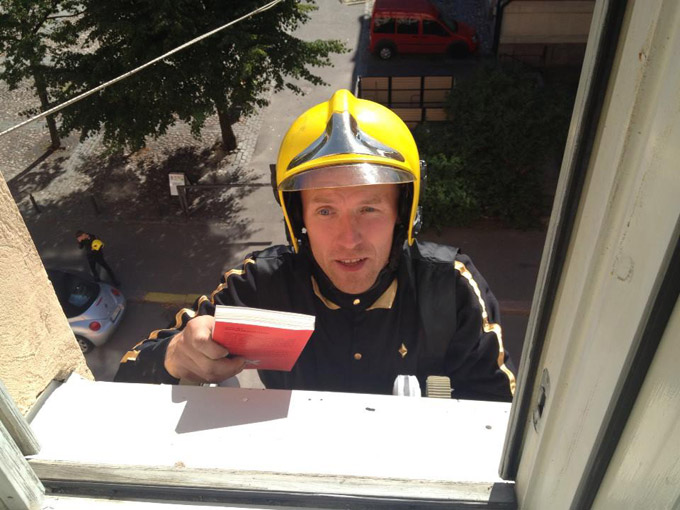
A fireman hands out a banned book printed as part of Ahmet Ögüt’s performance Fahrenheit 451: Reprinted. Photo courtesy of the artist, 2013.
In this episode of Forms of Life, host Nato Thompson speaks with the Istanbul-based artist Ahmet Ögüt about collaboration and continuous engagement in life and art alike. Inspired by the Occupy Gezi movement’s demonstrations of solidarity across class and ethnic lines, Ögüt has carried over his fondness for unexpected alliances to the participatory projects that he undertakes as an artist. For his public performance Fahrenheit 451:Reprinted, Ögüt worked with a crew of on-duty firemen to assemble and operate a mobile book-printing studio inside a Helsinki fire truck in August 2013. After the artist acquired the rights to reprint 20 books banned by various countries in modern times (from The Communist Manifesto to Alice’s Adventures in Wonderland), the firemen produced 1,500 new copies of the titles during the weeklong performance. Ögüt tells Thompson that the firemen’s ability to collaborate, improvise and act quickly is precisely “what’s missing in the art world.”
Ögüt has consistently dedicated himself to reactivating practices and people marginalized within, or banished from, artistic and political spheres. Faced with London’s throngs of overeducated and underemployed refugees, migrants and asylum seekers, the artist turned his 2012 residency at the Tate Modern into a platform for launching an autonomous educational network. Ögüt’s resulting Silent University—which today has branches in London, Stockholm and Vienna—bypasses legal limitations related to immigration status, mobilizing a marginalized intellectual community. Migrants and refugees reactivate the knowledge they possess but cannot easily employ in their new host countries through their activities as lecturers and students.
Reflecting on the communities he organizes, Ögüt emphasizes the need for cultural practitioners to establish long-term commitments rather than producing only ephemeral events on commission. For artists, he says, it’s about “lifetime engagement.”
—
Forms of Life is a monthly podcast hosted by Creative Time’s chief curator, Nato Thompson. Guests are culture makers whose work posits new ways of looking at political realities. By addressing a wide variety of issues—such as alternative economies, calcified political structures and new forms of collective living—or simply by being a thorn in the side of normality, Forms of Life interviews provide an opportunity to think counterintuitively about social conditions faced by people around the world.
Special thanks to The Clocktower Gallery and ARTonAIR.org for their support.

